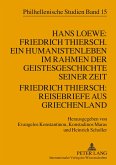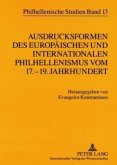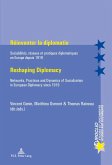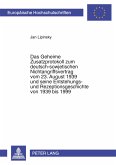Forschungs- und Diskussionsgegenstand der Beiträge dieses Bandes ist das Griechenlandbild, das in Kultur und Literatur verschiedener Nationen bestanden hat, seine Genese und Modifikation sowie sein Verhältnis zur Wirklichkeit. Ein Großteil einschlägiger literarischer Reflexe und Reflexionen fällt in die enge Epoche des Philhellenismus. Es ist aber nicht nur sinnvoll, sondern wissenschaftlich geboten, den Blick historisch auszuweiten: zurück zu den Anfängen europäischer Völkerspiegel in der Frühen Neuzeit und nach vorn bis in die Gegenwart. Denn nationale (Zerr-)Bilder und Stereotype wurzeln tief in der Geschichte und betreffen bis heute unser Denken. Die 30 Beiträge dieses Bandes von renommierten Forschern aus 14 Ländern bringen neue Erkenntnisse ans Licht und verleihen damit der Philhellenischen Forschung neue Impulse.
The research objective and discussion topic of the essays in the present volume is the image of Greece in the cultural, artistic and literary traditions in different countries in Europe and abroad, and the ways it was formed and modified. The essays raise also the issue to what extent this image corresponds to Greek realities. The main part of philhellenic images was formed during the early 19th century and during the 1820s and 1830s Philhellenism grew up to a European movement of considerable import. However, it is not only desirable, but also scientifically necessary to broaden the scope of the analysis of the reception of Greece in Europe and abroad in order to include both previous and subsequent forms of philhellenic images. Therefore the aim of the present volume is to concentrate on early forms of Philhellenism, but also on contemporary receptions of Greece in Europe and other continents. Besides an accurate account of how Greece has been perceived in the last four centuries, the essays also point out stereotypes and misconceptions that often characterize the image of Greece abroad. The volume gathers 30 works of researchers andexperts from 14 countries and gives a new impetus to the research of Philhellenism.
The research objective and discussion topic of the essays in the present volume is the image of Greece in the cultural, artistic and literary traditions in different countries in Europe and abroad, and the ways it was formed and modified. The essays raise also the issue to what extent this image corresponds to Greek realities. The main part of philhellenic images was formed during the early 19th century and during the 1820s and 1830s Philhellenism grew up to a European movement of considerable import. However, it is not only desirable, but also scientifically necessary to broaden the scope of the analysis of the reception of Greece in Europe and abroad in order to include both previous and subsequent forms of philhellenic images. Therefore the aim of the present volume is to concentrate on early forms of Philhellenism, but also on contemporary receptions of Greece in Europe and other continents. Besides an accurate account of how Greece has been perceived in the last four centuries, the essays also point out stereotypes and misconceptions that often characterize the image of Greece abroad. The volume gathers 30 works of researchers andexperts from 14 countries and gives a new impetus to the research of Philhellenism.









